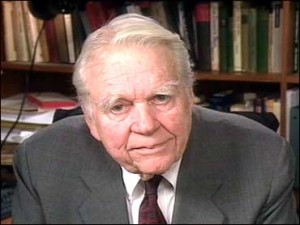Andy Rooney dies at 92
Legendary CBS News commentator Andy Rooney (known to millions for his witty essays on mundane topics) died Friday night in New York. He was 92.
He had been hospitalized after suffering complications following minor surgery last month.
“It’s a sad day at ’60 Minutes’ and for everybody here at CBS News” – said Jeff Fager, chairman of CBS News and the executive producer of ’60 Minutes.’ “It’s hard to imagine not having Andy around. He loved his life and he lived it on his own terms. We will miss him very much.”
Rooney made his last regular weekly appearance on ’60 Minutes’ on October 2. A few weeks later, CBS announced he was in a hospital.
Rooney’s colleague and longtime ’60 Minutes’ correspondent Morley Safer told CNN Saturday that Rooney worked to the very end and that he would not have wanted it any other way.
“That’s the way to go” – Safer said. “The only thing better than three weeks would have been three minutes.”
Correspondent Steve Kroft reflected on the length of Rooney’s storied career.
“What a life: ninety-two years of doing what you love to do while engaging and entertaining millions and millions of people” – he said.
And Lesley Stahl, also Rooney’s colleague on the show, called him “our poet laureate.”
“He was the Oracle of West 57th Street, an everyman if everyman wrote like a dream” – she said. “He was the most popular member of our team, loved by the audience, and far more loved by all of us than he knew.”
Andy Rooney, the curmudgeonly commentator who pondered everything from shoelaces to the existence of God on CBS’s ’60 Minutes’ news show for more than 30 years, died on Friday night at the age of 92 – CBS said.
Rooney, a four-time Emmy winner, died one month after he had signed off from ’60 Minutes’ in October, concluding a 33-year run. A statement on CBS News’ website said he died in a New York hospital of complications following minor surgery.
Rooney was a fixture on Sunday night television, closing out the ’60 Minutes’ broadcast with a short rant in his “A Few Minutes With Andy Rooney” segment. Sitting in his cluttered office at a desk he made himself, Rooney delivered more than 1.000 such essays, holding hold forth on a range of topics of varying degrees of relevance.
Adjectives like crusty, cranky and crabby frequently were attached to Rooney as he took critical looks at topics such as breakfast cereals or salad dressing, often with the overriding sentiment that things just weren’t as good as they used to be.
But, peering out from under his bushy white eyebrows, Rooney also analyzed presidents, critiqued the Iraq war and considered North Korea’s nuclear threat. His commentaries won three Emmy Awards.
“Underneath that gruff exterior, was a prickly interior … and deeper down was a sweet and gentle man, a patriot with a love of all things American, like good bourbon and a delicious hatred for prejudice and hypocrisy” – ’60 Minutes’ colleague Morley Safer said in a statement.
Rooney was a television writer and producer earlier in his career and preferred to think of himself as a writer who appeared on television. He joined CBS in 1949 as a writer for the popular “Arthur Godfrey’s Talent Scouts” show and later worked on “The Garry Moore Show.”
Beginning in 1962 he teamed with correspondent Harry Reasoner for CBS News, producing a series of specials with titles like “An Essay on Chairs” and “The Strange Case of the English Language.” In 1968 Rooney won his first Emmy for his script for “Black History: Lost, Stolen or Strayed.”
http://www.youtube.com/watch?v=nmaVNQlYWwM
Andy Rooney, who was a self-described indifferent scholar before rising to fame and fortune as a ’60 Minutes’ commentator, best-selling author and syndicated newspaper columnist, has died.
His death Friday at age 92 came after a brief hospitalization and complications that followed surgery. It also happened just weeks after he announced he was ending his commentaries on ’60 Minutes.’
Mr. Rooney cultivated a curmudgeon’s image and achieved celebrity status on TV with cranky complaints about quotidian experience and observations of life’s absurdities delivered in a band-saw voice frequently lampooned.
But to intimates who knew him the longest, Mister Rooney was a loyal friend with a big heart and a deep sentimental streak that the public never saw.
While he rebuffed fans who approached him in restaurants, refused to sign autographs and declined to write book blurbs for fellow authors, he cried easily when the names of old friends who had died came up in conversation and was the first to arrive to offer comfort when someone close to him suffered a loss.
“There was never a better friend” – said Barbara Dudley (91) of Rensselaerville, N.Y., a neighbor of Mr. Rooney’s in the Albany County town and a pal since the 1930′s. “I’ve been widowed twice, and both times it was Andrew who came to the rescue with his kindness.”
She never called him Andy over the course of an 80-year friendship.
The two came from the world of private school and privilege and met in sixth grade when each was enrolled at Mrs. Munson’s dancing school. All the boys had to wear white gloves so they wouldn’t mar the girls’ fancy dresses with clammy hands as they shuffled through waltzes and foxtrots. But Mr. Rooney’s bulldog build and muscular energy were more suited to football. He became co-captain of his high school team at Albany (N.Y.) Academy and was a starting lineman at Colgate University.
